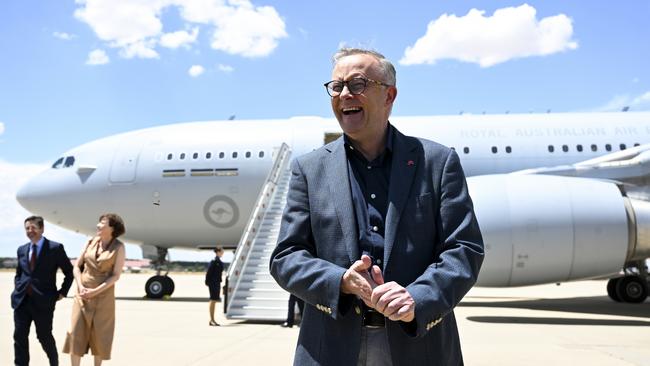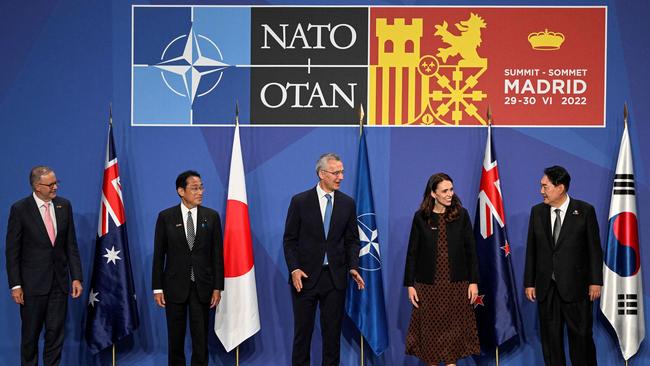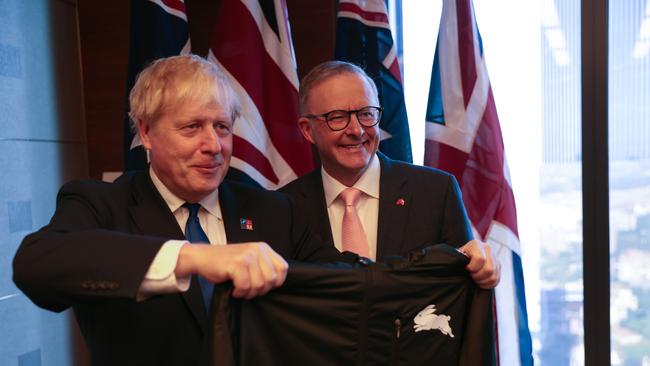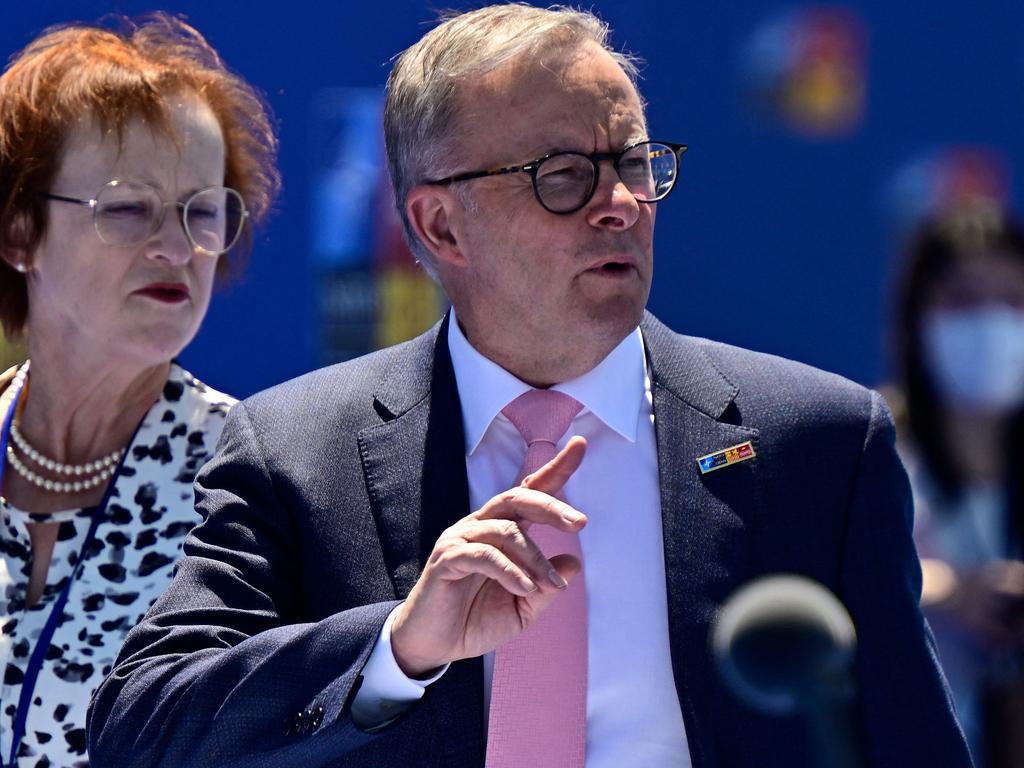NATO, G7 reveal ideological conflict has gone global
All the way through his high-octane European travels, the Prime Minister made the same strategic connection that Beijing hates.

The equations are intensely complicated, but the lineaments of the new conflict in global politics resemble in essence the Cold War before the Sino-Soviet split of the 1960s. The new conflict is both more complex, more serious and more dangerous than the first Cold War because China and Russia now are united in a relationship “without limits”. They have swapped places as to which is more dominant. Beijing, now the senior partner, is, economically, vastly more powerful than the old Soviet Union ever was.
This week’s G7 and NATO summits have focused on Russia’s brutal war against Ukraine. But they have also consistently expressed opposition and resistance to Beijing’s strategic policies, and the Chinese Communist Party furiously resents this.
The G7 summit, meeting in a Bavarian castle, denounced as a “war crime” Russia’s strike against a shopping mall in Kremenchuk in Ukraine that killed at least 18 people. But the G7 also announced a $US600bn ($872bn) Partnership for Global Infrastructure (supported by Canberra) as a democratic alternative for developing nations to China’s Belt and Road Initiative.
Fast forward to the NATO summit in Madrid. NATO will fast-track the admission of new members Finland and Sweden. This will double the size of Russia’s land border with NATO. It is exactly the kind of development – NATO enlargement and expansion towards Russia – that Vladimir Putin went to war in Ukraine to avoid. NATO will increase its troops at high readiness from 40,000 to 300,000. The US made a sweeping series of military commitments to Europe, including a US Army headquarters in Poland.
NATO’s strategic document named Russia as its chief adversary. However, for the first time, NATO called out China for its aggressive behaviour, regional intimidation and repeated cyber attacks. NATO criticised Beijing for its rapid, secretive increase in its arsenal of nuclear weapons. NATO also accused Beijing of waging grey-zone operations that fall just short of acts of war. This was stark, tough and a clear linkage between security in the NATO area – the Atlantic – and security in the Indo-Pacific. Beijing hated it and the Chinese Foreign Ministry denounced NATO for its “Cold War mentality and zero-sum games”. It said NATO should stop trying to mess up Asia after it had messed up Europe.
All the way through his high-octane European travels, the Prime Minister made the same strategic connection that Beijing hates. He told NATO: “By supporting peace and security in Europe, we are underscoring our iron-clad commitment to these norms in our own region, the Indo-Pacific. We recognise there is strategic competition in our region, and Australia is not afraid to stand up with all the countries of our region for an open, inclusive and prosperous Indo-Pacific.”

Albanese also said Beijing should “look at what is happening and look at the resolve” nations are displaying in solidarity with Ukraine and against Russian aggression. He urged Beijing to join NATO members and dozens of other nations in condemning Moscow’s actions in Ukraine. He also advised Beijing to learn from Moscow’s failure to conquer Ukraine when deciding its actions regarding Taiwan.
China Daily, an official Chinese government newspaper, denounced Albanese in a furious editorial. This is more serious than being denounced in the routinely loudmouthed, bellicose Global Times. China Daily attacked Albanese personally, commenting: “It is hard to believe that the new Australian leader can be so ill informed as to not know China’s stance on the Ukraine crisis … or that he can be so ignorant as not to understand the status of Taiwan.”
It said the Chinese government had displayed nothing but goodwill towards the Albanese government (presumably including the interception by a Chinese jet fighter of an Australian maritime patrol aircraft as goodwill) but “so far, Canberra has not reciprocated”.
There came the ultimate condemnation: “From deliberately playing up and smearing China’s normal security co-operation with the Solomon Islands to eagerly jumping on the US bandwagon drumming up support for its containment policy against China, the current Australian government has displayed no signs of changing the course set by its predecessor.”
So there you have it – for China Daily, Albanese is no better than Scott Morrison.
Nonetheless, being criticised by China Daily is not quite the same as being denounced by the Chinese government itself. Albanese has been right to couch his tough-minded security continuity in moderate and polite tones. He shouldn’t be provoked into changing that tone, nor should he be intimidated into diminishing the strategic continuity.
Whatever happens in war and peace over the next decade, the G7 and NATO meetings will be seen as pivotal. European and Asian security are now deeply enmeshed, just as they were in the Cold War, just as they were in World War II.
But there are tremendous cross-currents running. Sorting out analytically what they all mean for Australia is an exacting task.
Albanese is right in his government’s essential insight that resistance to Russian aggression in Ukraine is not only good in itself but is also good for Asian security. Nothing is more strategically provocative than weakness. It was partly a miscalculation of US weakness arising out of the chaotic US withdrawal from Afghanistan that helped convince Putin he could invade Ukraine without experiencing strong consequences from the West. This was a miscalculation.
Once Ukraine embarked on its own heroic resistance, the West fairly quickly came in with massive material, logistics and financial support.

There was a significant if generally low-key debate among Washington’s Asianists over whether the US should divert its attention from dealing with China to offer significant support for Ukraine. Mike Green, now the new head of the US Studies Centre at the University of Sydney, was a key American Asianist arguing the US had to do both.
However, long decades of European neglect of its defence forces and US involvement in ultimately unsuccessful land wars in the greater Middle East mean the West’s resources are severely limited. Joe Biden is substantially bolstering the US military presence in Europe. In terms of Australia’s interests, to put it simply, this reinforces the US Army against the US Navy in the never-ending contest for defence dollars.
The US Navy is now smaller than China’s navy. And the US Navy has global responsibilities, whereas if Beijing ever launches an invasion of Taiwan it will focus all its forces in and on the region. It is right for the US and its allies to stand up to Russia, but Russia is a fraction of the threat that China provides. All Western allied nations, certainly including Australia, need to do much more in defence, devote much greater resources to it, and do so quickly, if they are to deter Beijing in Asia and Moscow in Europe.
A similar dynamic applies, less importantly, to Britain. UK Defence Secretary Ben Wallace wants to increase defence spending to 2.5 per cent of British gross domestic product. Senior British military figures talk of this being Britain’s “1937 moment”, by which they seek to evoke London’s failure to prepare adequately in the face of Nazi military expansion.
Wallace wants a much bigger and better equipped British Army. Again this must mean less emphasis on the British navy and more British navy deployment in Europe. This illustrates the extreme folly of the Morrison government in its thought that Britain, or even the US, basing some naval assets for a time in Australia was a substitute for Australia having real navy strike capacity of its own, beyond the ageing Collins-class subs and the prospect of the nuclear-powered subs on some distant Star Trek timeline. We need capability straight away.
There were other dynamics emerging from the NATO summit that were both good and bad for Australia. NATO invited four Asian democracies to attend – Japan, South Korea, Australia and New Zealand. That’s welcome. Japanese Prime Minister Fumio Kishida told the summit that European and Asian security could not be divorced.
It’s a singular achievement to get Japan and South Korea in the same room of a collective military alliance and working together. The three-way historical enmities involving Japan, Korea and China are of an intensity and depth that few Australians have any idea about.
Of the four Pacific democracies attending, our close neighbour, New Zealand, counts for almost nothing strategically. Indeed, if we ever do get the AUKUS nuclear-powered subs they won’t be able to visit the ports of our cousins across the Tasman because of Wellington’s cockamamie, antique neutralist Cold War cop-out policy outlawing the visit of nuclear-armed or nuclear-powered vessels. Nonetheless, it’s better to have New Zealand there than not.
But the Asian powers that were not there are also telling. NATO could not invite India, mainly because New Delhi is too dependent on Russian military hi-tech to directly condemn Moscow for its actions in Ukraine. This situation represents a failure in US diplomacy towards India. When the two capitals – Washington and Delhi – began their strategic embrace under George W. Bush, the idea was that the US would become India’s main defence supplier. That has never happened.
Yet India is the world’s biggest democracy. The world’s third biggest democracy, Indonesia, also was not there and not likely to have come if invited.
Also absent were the US treaty military allies in Southeast Asia, The Philippines and Thailand. Again, poor US diplomacy has contributed to both those nations drifting dangerously close to Beijing. Washington has pursued perfectly idiotic policies of detachment and semi-isolation against the Thai military-led government. While it is not a perfectly democratic government, it has a far better human rights record than numerous US allies. Long US neglect, and substantial Australian neglect as well, drove Bangkok into strategic semi-embrace of Beijing.
Meanwhile Chinese money is powerful in Philippines politics. Southeast Asia is complex and difficult. The Biden administration has made an effort in the region but it’s not as strong as it should be. Foreign Minister Penny Wong is right to emphasise the South Pacific and Southeast Asia as the highest possible priorities of her energies over the next three years.
If there is conflict over Taiwan, the key Asian states will be Japan and South Korea, both excellent allies of the US. But the attitudes of India, Indonesia and the rest of Southeast Asia are critical in the long-term management and deterrence of Beijing.
Incidentally, Ukraine demonstrates the ongoing global centrality of both NATO and the US alliance system in Asia. These two great alliance systems cannot be merged but must come into very deep co-operation.
Leaders as diverse as France’s Emmanuel Macron and Donald Trump have in recent years occasionally mocked NATO, claiming it was brain dead, had outlived its usefulness, served no purpose etc. These comments were extraordinarily stupid.
One lesson of the post-Cold War period is that it is much more effective, much more achievable, to keep and adapt existing US-centric institutions, such as NATO or the US Asian alliance system, than it is to create new institutions such as the Trans-Pacific Partnership, which Barack Obama was too timid to submit for Senate ratification and from which Trump ultimately walked away. NATO has just committed itself to its biggest military expansion since the end of the Cold War and US allies are critically important in Asia.
Countless other dynamics are in play. We are assuming Ukrainian victory too readily and too early. Russia’s tactics are now extremely crude and criminally destructive of life, but it continues to gain territory in Ukraine while the human cost to Ukrainians and the financial costs to allies are vast.
Europe’s greatest weakness is its energy dependence on Russia. High energy prices mean that Moscow may even now be getting more money – though not US dollars – from its energy exports than it was before the war began. The chance of recession in Europe and the US is high. The green policy dreams of European governments and the Biden administration have made the West less energy independent and more liable to Russian blackmail.
Albanese has been understandably touting Australia as a reliable food supplier and we could sell any gas we can produce. But, like Europe, we too are exposed by economic dependency, in our case our continuing trade dependency on China. We have absorbed a few Chinese boycotts well enough, but our national wealth is still dangerously dependent on our chief strategic threat.
Meanwhile, Defence Minister Richard Marles has assured us that by next March we will know which nuclear-powered submarine we will acquire under AUKUS, when we will get it, what capability gap will arise and how we will fill that. In truth we have capability gaps everywhere right now. Submarines, important as they are, are not the totality of a credible defence effort.
Our paralysed defence establishment has barely moved an inch towards the type of asymmetric capabilities we should be acquiring as fast as we can, given the gravity of the strategic situation.
Important and genuinely praiseworthy as Albanese’s strategic diplomacy has been, it is on the far more prosaic front of ruthlessly managing the defence budget and, with hitherto undreamed of speed, actually acquiring relevant defence capabilities on a scale that gives us genuine deterrent force that history will judge the Albanese government.








With the NATO summit in Spain, attended by Anthony Albanese, ideological conflict has gone global. Australia lines up with its old friends, the US, Europe, Japan, South Korea, even, astonishingly, New Zealand, and against its old enemies, Russia and China.